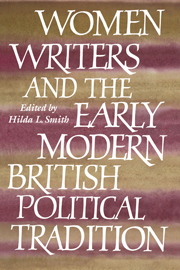Book contents
- Frontmatter
- Contents
- List of contributors
- Preface
- Introduction: Women, intellect, and politics: their intersection in seventeenth-century England
- Part I Women's political writings, 1400–1690
- Part II Women's political and philosophical writings, 1690–1800
- Part III The intellectual context and economic setting for early modern women
- Part IV Early modern legal and political prescriptions for women
- Introduction to Part IV
- 13 The politics of identity and monarchic government in France: the debate over female exclusion
- 14 The Holy Roman Empire: women and politics beyond liberalism, individual rights, and revolutionary theory
- 15 Women as sextons and electors: King's Bench and precedents for women's citizenship
- 16 “To be some body”: married women and The Hardships of the English Laws
- Conclusion: women's writing, women's standing: theory and politics in the early modern period
- Index
Introduction to Part IV
from Part IV - Early modern legal and political prescriptions for women
Published online by Cambridge University Press: 04 August 2010
- Frontmatter
- Contents
- List of contributors
- Preface
- Introduction: Women, intellect, and politics: their intersection in seventeenth-century England
- Part I Women's political writings, 1400–1690
- Part II Women's political and philosophical writings, 1690–1800
- Part III The intellectual context and economic setting for early modern women
- Part IV Early modern legal and political prescriptions for women
- Introduction to Part IV
- 13 The politics of identity and monarchic government in France: the debate over female exclusion
- 14 The Holy Roman Empire: women and politics beyond liberalism, individual rights, and revolutionary theory
- 15 Women as sextons and electors: King's Bench and precedents for women's citizenship
- 16 “To be some body”: married women and The Hardships of the English Laws
- Conclusion: women's writing, women's standing: theory and politics in the early modern period
- Index
Summary
The last part of this collection of essays concentrates on the political/legal values and structures of fifteenth- and sixteenth-century France, sixteenth- and seventeenth-century imperial Germany, and seventeenth- and eighteenth-century Britain. More than the other sections of this work, it provides a comparative framework through which to view the intersection between how women viewed the state and their relation to it. It clarifies the need to move beyond any single form of government, scenario of political change or specific historiography if we are to understand the role gender plays in state formation and political values. While women in each case almost invariably lacked the political standing of men, and wrote less on explicitly political topics than did their male counterparts, still their political selves (and their conception of public space and exchange) were strongly affected by the power realities of their time and place.
These four chapters explore the distinct cultural and material parameters that dictated both the language and acceptable evidence for use by both women and men in framing arguments concerning women's political standing. Chapter 13 reassesses the construction and use of Salic law in late medieval and early modern France to document how jurists and clerics fabricate its origin and authenticity. Chapter 14 turns to imperial Germany and moves beyond the assumptions embedded in the vast majority of scholarship on women's early modern political nature and writings.
- Type
- Chapter
- Information
- Women Writers and the Early Modern British Political Tradition , pp. 281 - 288Publisher: Cambridge University PressPrint publication year: 1998

